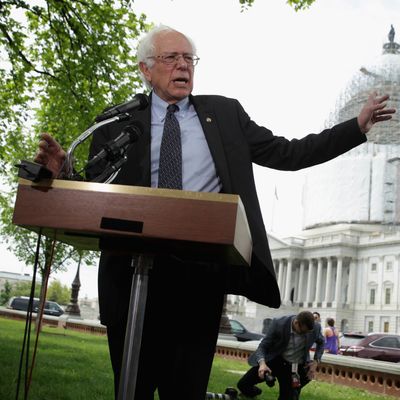
Bernie Sanders launched his campaign for president Thursday like only he could: briefly, bluntly, and without the sentimentalism and carefully coordinated stagecraft that characterizes most political campaigns.
Three minutes after noon, he exited the Senate, his shaggy white hair blowing around in the wind, and made his way toward the assembled press. A few photographers jogged over to photograph him as he walked, but there was no Scooby Van melee like the scene that dominated headlines when Hillary campaigned in Iowa two weeks ago. “Let me just make a brief comment,” Sanders said, gesturing to the Capitol behind him and the day job he’d be returning to, ten minutes and 31 seconds after he started his first campaign event. “We don’t have an endless amount of time. I’ve got to get back.”
It was an unusual place to launch a presidential campaign. Marco Rubio launched his at Miami’s historic Freedom Tower. Ted Cruz announced before cheering students at the conservative Liberty University. Hillary Clinton basically announced from the set of an Allstate Insurance ad. Sanders chose a slightly more prosaic landscape: a soggy patch of grass outside the Senate building known as “the swamp,” which serves as a last-minute press conference location for lawmakers on Capitol Hill.
But it made sense. This was the location likeliest to turn up the media, and Sanders has been waging his bid primarily through the press for several months, taking interviews and discussing his considerations quite openly with any media organization willing to listen. That’s not to say he doesn’t have any support — he is, apparently, the most liked Democratic Senator on Facebook — but he’s already conceding that the millionaire donors who are essential to competing in our plutocratic presidential elections are not going to be rushing to donate to his cause.
“We’re not going to raise $2 billion, and we’re not going to raise $1 billion,” Sanders has said. “I do not have millionaire or billionaire friends.” Instead, he said, he planned to run a campaign based on small donations from Americans who share two of his biggest concerns: growing income inequality and the fact that, thanks to Citizens United, “billionaires are literally able to buy elections.” Traveling the country, he’d met too many struggling people. “They’re working longer hours for lower wages, they’re earning less money than they’re used to,” he said. “My conclusion is that that type of economics is not only immoral, it’s not only wrong, it is unsustainable. It can’t continue.”
Without the money to get this message out himself, Sanders is going to need the press — but he’s also been very clear that he’s not willing to engage in the controversy-stoking the press feeds off of. “You’re not going to be the 16th writer who asks me about Hillary, are you?” Sanders pressed Dave Weigel last month when he asked the Vermont Senator about Hillary’s emails. “I know you would not do that. You want to ask me about the state of the economy, unemployment, poverty. You would not ask me about my views on Hillary Clinton.”
In his brief announcement, he pleaded multiple times with the media not to bother trying to bait him. “I ask the media’s help on this: allow us to discuss the important issues facing the American people, and let’s not get hung up on political gossip.” But that didn’t mean he wouldn’t ever criticize Hillary Clinton. “Let’s be clear, to say that people disagree on issues and point out those issues, that’s what a debate is about,” he said, noting that he had been a strong opponent of the Iraq War, the Keystone Pipeline, and the trade deal debated last week in Congress.
Can a candidate with no money who refuses to run on anything but his own terms have a real impact on the race? Sanders, an audacious optimist, clearly thinks so. “We’re in this race to win,” he said. A few minutes later, he turned away from the podium and went back to work.





























